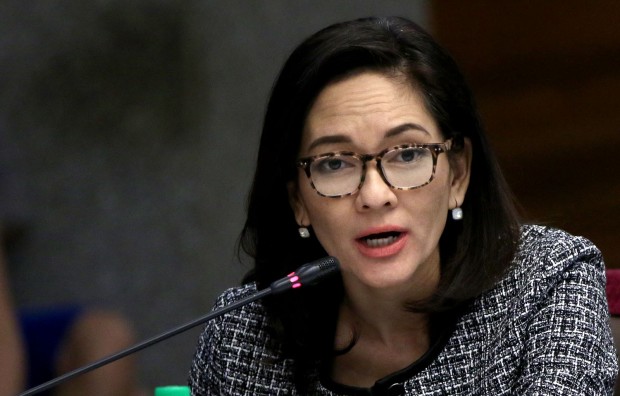Senate bill to fast-track adoption process hurdles second reading

Sen. Risa Hontiveros. INQUIRER file photo / RICHARD A. REYES
The Senate has approved on second reading a bill proposing a simpler and less costly legal adoption process of a child by allowing the correction of simulated birth records through administrative proceedings instead of court proceedings.
Senate Bill 2081 was approved on second reading Tuesday without amendments and is expected to be passed on third and final reading next week.
In her sponsorship speech, Senator Risa Hontiveros, chair of the Senate committee on women, children, family relations and gender equality, said the bill seeks to correct the status of a child whose birth was simulated by opening the avenue for a legal adoption that the child may enjoy all the benefits offered by the law to legally adopted children.
“To remedy the problem of a lengthy and financially restrictive adoption proceedings, this bill likewise proposes a simpler and less costly administrative adoption process without compromising the safety and integrity of the child,” Hontiveros added.
According to the measure, “birth simulation” refers to the tampering of the civil registry to make it appear in the record of birth that a child was born to a person who is not the child’s biological mother.
Article continues after this advertisementSenate Bill 2081 is a substitution of Senate Bill 1725 introduced by Senator Grace Poe, and Senate Bill 1728 prepared by Hontiveros and Senator Leila de Lima.
Article continues after this advertisementIts counterpart measure, House Bill No. 5675, was approved by the House of Representatives on August 29 last year.
The bill also aims to grant amnesty and allow the rectification of the simulated birth of a child “where simulation was made for the best interest of the child, and that such child has been consistently considered and treated by the person” who considered the child as his or her own.
Poe, the principal author, cited that Republic Act 8552, also known as the “Domestic Adoption Act” recognizes informal adoptions or more commonly known as simulated births.
READ: Poe files bill to simplify adoption process
“While Section 21 (b) of the said Act penalizes any person who shall cause the fictitious registration of the birth of a child under the name(s) of a person(s) who is not his/her biological parent(s), it also provided for an amnesty for those who did so for the best interest of the child. However, this amnesty resulted in a lacuna in the law in that it only allowed the rectification of those who 1) did so before the effectivity of the law on 22 March 1998; and (2) filed a petition for adoption within five (5) years from the effectivity of the Act or until 22 March 2003,” she explained.
This provision, she said, makes adoption process “tedious and excessively costly for ordinary Filipinos,” the senator said.
“This leaves a lot of adoptees under assumed filiation and unduly deprived of the benefits of legitimacy and succession,” she added.
To fast-track the adoption process, those who simulated the birth record of a child should be exempt from criminal, civil and administrative liability provided that the application to rectify a simulated birth record should be filed within 10 years from the effectivity of the measure.
Instead of going through the courts, those who will file a petition may do so through the Social Welfare and Development Officer of the city or municipality where the child resides.
The Secretary of the Department of Social Welfare and Development will decide on the petition within 30 days from receipt of the recommendation of the department’s regional director.
After all requirements for administrative adoption have been met, the child will be considered the legitimate child of a person and as such is entitled to all rights and obligations provided by law to legitimate children born to them. /jpv